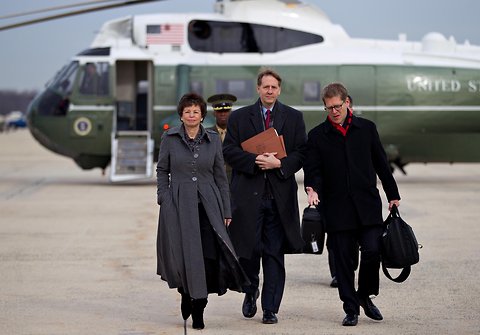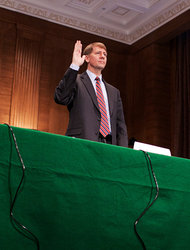As part of the last-minute negotiations, the lawmakers were haggling over unemployment benefits, cuts in Medicare payments to doctors, taxes on large inheritances and how to limit the impact of the alternative minimum tax, a parallel income tax system that is intended to ensure the rich pay a fair share but that is increasingly encroaching on the middle class.
President Obama said that if talks between the Senate leaders broke down, he wanted the Senate to schedule an up-or-down vote on a narrower measure that would extend only the middle-class tax breaks and unemployment benefits.
If Congress is unable to act before the new year, Washington will have effectively ushered in a series of automatic tax increases and a program of drastic spending cuts that economists say could pitch the country back into recession.
The president and lawmakers put those spending cuts and tax increases in place this year as draconian incentives that would force them to confront the nation’s growing debt. Now, lawmakers are doing everything they can to keep them from happening.
“We just can’t afford a politically self-inflicted wound to our economy,” Mr. Obama said Saturday in his weekly address. “The housing market is healing, but that could stall if folks are seeing smaller paychecks. The unemployment rate is the lowest it’s been since 2008, but already families and businesses are starting to hold back because of the dysfunction they see in Washington.”
The fear of another painful economic slowdown appears to have accelerated deal-making on Capitol Hill with just 48 hours left before the so-called fiscal cliff arrives. Weeks of public sniping between Senator Harry Reid of Nevada, the Democratic leader, and Senator Mitch McConnell of Kentucky, the Republican leader, ebbed on Friday evening with pledges of cooperation and optimism from both.
On Saturday, though, that sentiment was put to the test as 98 senators waited for word whether their leaders had come up with a proposal that might pass muster with members of both parties. The first votes in the Senate, if needed, are scheduled for Sunday afternoon.
“It’s a little like playing Russian roulette with the economy,” said Senator Mark Warner, Democrat of Virginia. “The consequences could be enormous.”
Members of Congress were mostly absent from the Capitol on Saturday, after two days of Senate votes on other matters and a day before both chambers were to reconvene. However, senior aides were working on proposals in their offices or at their homes.
Speaker John A. Boehner stopped by the Capitol briefly to see his chief of staff on Saturday afternoon. Mr. McConnell also paid a visit.
Aides to Mr. Reid were expecting to receive offers from Mr. McConnell’s staff, but no progress was reported by midday. Even if the talks took a positive turn, Senate aides said, no announcement was expected before the leaders briefed their caucuses on Sunday.
The chief sticking point among lawmakers and the president continued to be how to set tax rates for the next decade and beyond. Mr. Obama and Democrats have said they want tax rates to rise on income over $250,000 a year, while Republicans want a higher threshold, perhaps at $400,000.
The political drama in Washington over the weekend was given greater urgency by the fear that the economic gains of the past two years could be lost if no deal is reached.
Some of the consequences of Congressional inaction would be felt almost at once on Tuesday, in employee paychecks, doctors’ offices and financial markets. Analysts said the effect would be cumulative, building over time.
An early barometer would probably be the financial markets, where skittish investors, as they have during previous Congressional cliffhangers, could send the stock market lower on fears of another prolonged period of economic distress.
In 2011, the political battles over whether to raise the nation’s borrowing limit prompted Standard Poor’s to downgrade its rating of American debt, suggesting a higher risk of default. The Dow Jones industrial average fell 635 points in a volatile day of trading after the downgrade.
This month, traders have again nervously watched the political maneuvering in Washington, and the markets have jumped or dropped at tidbits of news from the negotiations. Two weeks ago, Ben S. Bernanke, the chairman of the Federal Reserve Board, predicted that if lawmakers failed to reach a deal, “the economy will, I think, go off the cliff.”
Immediately — regardless of whether Congress and Mr. Obama reach a deal — every working American’s taxes will go up because neither party is fighting to extend a Social Security payroll tax cut that has been in place for two years.
Robert Pear and Jennifer Steinhauer contributed reporting.
Article source: http://www.nytimes.com/2012/12/30/us/politics/president-obama-urges-last-minute-tax-deal.html?partner=rss&emc=rss

